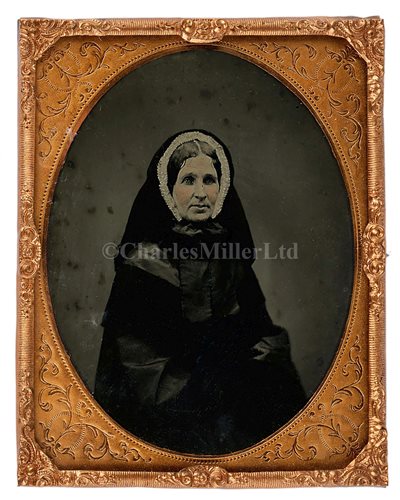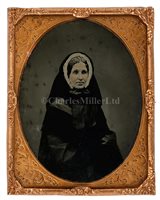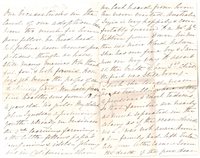7th Nov, 2017 12:00
Maritime and Scientific Models, Instruments & Art ('Fearless')
48
[M] AN AMBROTYPE CABINET PORTRAIT BELIEVED TO BE...
AN AMBROTYPE CABINET PORTRAIT BELIEVED TO BE OF HORATIA NELSON, CIRCA 1850
depicted half-length in black satin costume with white frilled bonnet cap and delicately rouged cheeks, mounted in decorative gilt brass surround and set within folding plush-lined leather pocket case -- 3¾ x 3¼in. (9.5 x 8.5cm.); together with a letter sent by Mrs Alexander Wilson, Ballarat, Austrailia, on behalf of her ailing husband to his brother, dated May 2nd 1869 and relating the families connection to Lord Nelson; an English School miniature portrait of Horatia Nelson's doctor, John Mace Jnr., dated 6th June, 1843; an associated black leather wallet with mss owner's name inside inscribed Benjm. Colby / Mar 1823 containing three Bank of Ireland treasury cheques from March 1799 signed by Col. H.J.A. Woodward; and a quill pen by tradition believed to have been one of Nelsons.
(5)
Provenance: Mrs Colby Borley née Wilson and thence by decent. A paragraph in the above-mentioned letter states: "...Lizzie is very happily & comfortably married to a Mr. McKibbin from Down. His mother was niece to Lord Nelson..."; Benjamin Colby was related to Col. H.J.A. Woodward who had presented him his annotated history of Nelson, see lot 49
Horatia Nelson Ward (1801-1881) was the love child of Nelson and his mistress, Emma Hamilton. After Emma's husband, Sir William Hamilton, died in 1803, Horatia was christened with Nelson and Emma being listed as "godparents" and was shortly afterwards adopted as an "orphan". Nelson wrote to her before Trafalgar signing his letter as her "Father", left her £200 per annum in his will and asked that she take his name. After Trafalgar Emma fell on hard times and she and Horatia spent some ten months in debtors prison - a fact that caused Horatia to deny Emma as her mother. She arranged Emma's funeral in Calais in 1815 and returned to Britain disguised as a boy to evade debtors. Living in Sussex with Nelson's sister, Catherine Matcham, she was reputedly good at languages, music and sewing - all skills taught by Emma. In 1822 she married the Rev. Philip Ward (1795-1859) at Burnham Westgate - near to Nelson's father's Parish in Norfolk, and went on to produce ten children. After Philip died, Horatia moved several times and, despite renewed interest in Nelson, struggled financially. For a while she resided in Tenterden and clearly made friends with the local Doctor whose miniature accompanies the lot. She died and was buried in Pinner, along with two of her children.
Of the known portraits of Horatia, several are oil paintings from childhood and, until now, two photographic. The last picture taken in 1859 shows a more sunken and care-worn face than that revealed in this ambrotype, suggesting a date of 8-10 years earlier. Ambrotype photography was the successor to the first commercially successful type developed by Louis Daguerre in the 1830s and was popular from about 1850. Whilst it captures more detail and is warmer to behold, each image was exposed on fragile glass with no negative produced from which to make copies. As such, they are usually found in protective leather cases.
depicted half-length in black satin costume with white frilled bonnet cap and delicately rouged cheeks, mounted in decorative gilt brass surround and set within folding plush-lined leather pocket case -- 3¾ x 3¼in. (9.5 x 8.5cm.); together with a letter sent by Mrs Alexander Wilson, Ballarat, Austrailia, on behalf of her ailing husband to his brother, dated May 2nd 1869 and relating the families connection to Lord Nelson; an English School miniature portrait of Horatia Nelson's doctor, John Mace Jnr., dated 6th June, 1843; an associated black leather wallet with mss owner's name inside inscribed Benjm. Colby / Mar 1823 containing three Bank of Ireland treasury cheques from March 1799 signed by Col. H.J.A. Woodward; and a quill pen by tradition believed to have been one of Nelsons.
(5)
Provenance: Mrs Colby Borley née Wilson and thence by decent. A paragraph in the above-mentioned letter states: "...Lizzie is very happily & comfortably married to a Mr. McKibbin from Down. His mother was niece to Lord Nelson..."; Benjamin Colby was related to Col. H.J.A. Woodward who had presented him his annotated history of Nelson, see lot 49
Horatia Nelson Ward (1801-1881) was the love child of Nelson and his mistress, Emma Hamilton. After Emma's husband, Sir William Hamilton, died in 1803, Horatia was christened with Nelson and Emma being listed as "godparents" and was shortly afterwards adopted as an "orphan". Nelson wrote to her before Trafalgar signing his letter as her "Father", left her £200 per annum in his will and asked that she take his name. After Trafalgar Emma fell on hard times and she and Horatia spent some ten months in debtors prison - a fact that caused Horatia to deny Emma as her mother. She arranged Emma's funeral in Calais in 1815 and returned to Britain disguised as a boy to evade debtors. Living in Sussex with Nelson's sister, Catherine Matcham, she was reputedly good at languages, music and sewing - all skills taught by Emma. In 1822 she married the Rev. Philip Ward (1795-1859) at Burnham Westgate - near to Nelson's father's Parish in Norfolk, and went on to produce ten children. After Philip died, Horatia moved several times and, despite renewed interest in Nelson, struggled financially. For a while she resided in Tenterden and clearly made friends with the local Doctor whose miniature accompanies the lot. She died and was buried in Pinner, along with two of her children.
Of the known portraits of Horatia, several are oil paintings from childhood and, until now, two photographic. The last picture taken in 1859 shows a more sunken and care-worn face than that revealed in this ambrotype, suggesting a date of 8-10 years earlier. Ambrotype photography was the successor to the first commercially successful type developed by Louis Daguerre in the 1830s and was popular from about 1850. Whilst it captures more detail and is warmer to behold, each image was exposed on fragile glass with no negative produced from which to make copies. As such, they are usually found in protective leather cases.
Sold for £1,240
Estimated at £1,000 - £1,500
(inc. buyer's premium of 24%)
AN AMBROTYPE CABINET PORTRAIT BELIEVED TO BE OF HORATIA NELSON, CIRCA 1850
depicted half-length in black satin costume with white frilled bonnet cap and delicately rouged cheeks, mounted in decorative gilt brass surround and set within folding plush-lined leather pocket case -- 3¾ x 3¼in. (9.5 x 8.5cm.); together with a letter sent by Mrs Alexander Wilson, Ballarat, Austrailia, on behalf of her ailing husband to his brother, dated May 2nd 1869 and relating the families connection to Lord Nelson; an English School miniature portrait of Horatia Nelson's doctor, John Mace Jnr., dated 6th June, 1843; an associated black leather wallet with mss owner's name inside inscribed Benjm. Colby / Mar 1823 containing three Bank of Ireland treasury cheques from March 1799 signed by Col. H.J.A. Woodward; and a quill pen by tradition believed to have been one of Nelsons.
(5)
Provenance: Mrs Colby Borley née Wilson and thence by decent. A paragraph in the above-mentioned letter states: "...Lizzie is very happily & comfortably married to a Mr. McKibbin from Down. His mother was niece to Lord Nelson..."; Benjamin Colby was related to Col. H.J.A. Woodward who had presented him his annotated history of Nelson, see lot 49
Horatia Nelson Ward (1801-1881) was the love child of Nelson and his mistress, Emma Hamilton. After Emma's husband, Sir William Hamilton, died in 1803, Horatia was christened with Nelson and Emma being listed as "godparents" and was shortly afterwards adopted as an "orphan". Nelson wrote to her before Trafalgar signing his letter as her "Father", left her £200 per annum in his will and asked that she take his name. After Trafalgar Emma fell on hard times and she and Horatia spent some ten months in debtors prison - a fact that caused Horatia to deny Emma as her mother. She arranged Emma's funeral in Calais in 1815 and returned to Britain disguised as a boy to evade debtors. Living in Sussex with Nelson's sister, Catherine Matcham, she was reputedly good at languages, music and sewing - all skills taught by Emma. In 1822 she married the Rev. Philip Ward (1795-1859) at Burnham Westgate - near to Nelson's father's Parish in Norfolk, and went on to produce ten children. After Philip died, Horatia moved several times and, despite renewed interest in Nelson, struggled financially. For a while she resided in Tenterden and clearly made friends with the local Doctor whose miniature accompanies the lot. She died and was buried in Pinner, along with two of her children.
Of the known portraits of Horatia, several are oil paintings from childhood and, until now, two photographic. The last picture taken in 1859 shows a more sunken and care-worn face than that revealed in this ambrotype, suggesting a date of 8-10 years earlier. Ambrotype photography was the successor to the first commercially successful type developed by Louis Daguerre in the 1830s and was popular from about 1850. Whilst it captures more detail and is warmer to behold, each image was exposed on fragile glass with no negative produced from which to make copies. As such, they are usually found in protective leather cases.
depicted half-length in black satin costume with white frilled bonnet cap and delicately rouged cheeks, mounted in decorative gilt brass surround and set within folding plush-lined leather pocket case -- 3¾ x 3¼in. (9.5 x 8.5cm.); together with a letter sent by Mrs Alexander Wilson, Ballarat, Austrailia, on behalf of her ailing husband to his brother, dated May 2nd 1869 and relating the families connection to Lord Nelson; an English School miniature portrait of Horatia Nelson's doctor, John Mace Jnr., dated 6th June, 1843; an associated black leather wallet with mss owner's name inside inscribed Benjm. Colby / Mar 1823 containing three Bank of Ireland treasury cheques from March 1799 signed by Col. H.J.A. Woodward; and a quill pen by tradition believed to have been one of Nelsons.
(5)
Provenance: Mrs Colby Borley née Wilson and thence by decent. A paragraph in the above-mentioned letter states: "...Lizzie is very happily & comfortably married to a Mr. McKibbin from Down. His mother was niece to Lord Nelson..."; Benjamin Colby was related to Col. H.J.A. Woodward who had presented him his annotated history of Nelson, see lot 49
Horatia Nelson Ward (1801-1881) was the love child of Nelson and his mistress, Emma Hamilton. After Emma's husband, Sir William Hamilton, died in 1803, Horatia was christened with Nelson and Emma being listed as "godparents" and was shortly afterwards adopted as an "orphan". Nelson wrote to her before Trafalgar signing his letter as her "Father", left her £200 per annum in his will and asked that she take his name. After Trafalgar Emma fell on hard times and she and Horatia spent some ten months in debtors prison - a fact that caused Horatia to deny Emma as her mother. She arranged Emma's funeral in Calais in 1815 and returned to Britain disguised as a boy to evade debtors. Living in Sussex with Nelson's sister, Catherine Matcham, she was reputedly good at languages, music and sewing - all skills taught by Emma. In 1822 she married the Rev. Philip Ward (1795-1859) at Burnham Westgate - near to Nelson's father's Parish in Norfolk, and went on to produce ten children. After Philip died, Horatia moved several times and, despite renewed interest in Nelson, struggled financially. For a while she resided in Tenterden and clearly made friends with the local Doctor whose miniature accompanies the lot. She died and was buried in Pinner, along with two of her children.
Of the known portraits of Horatia, several are oil paintings from childhood and, until now, two photographic. The last picture taken in 1859 shows a more sunken and care-worn face than that revealed in this ambrotype, suggesting a date of 8-10 years earlier. Ambrotype photography was the successor to the first commercially successful type developed by Louis Daguerre in the 1830s and was popular from about 1850. Whilst it captures more detail and is warmer to behold, each image was exposed on fragile glass with no negative produced from which to make copies. As such, they are usually found in protective leather cases.
Auction: Maritime and Scientific Models, Instruments & Art ('Fearless'), 7th Nov, 2017



